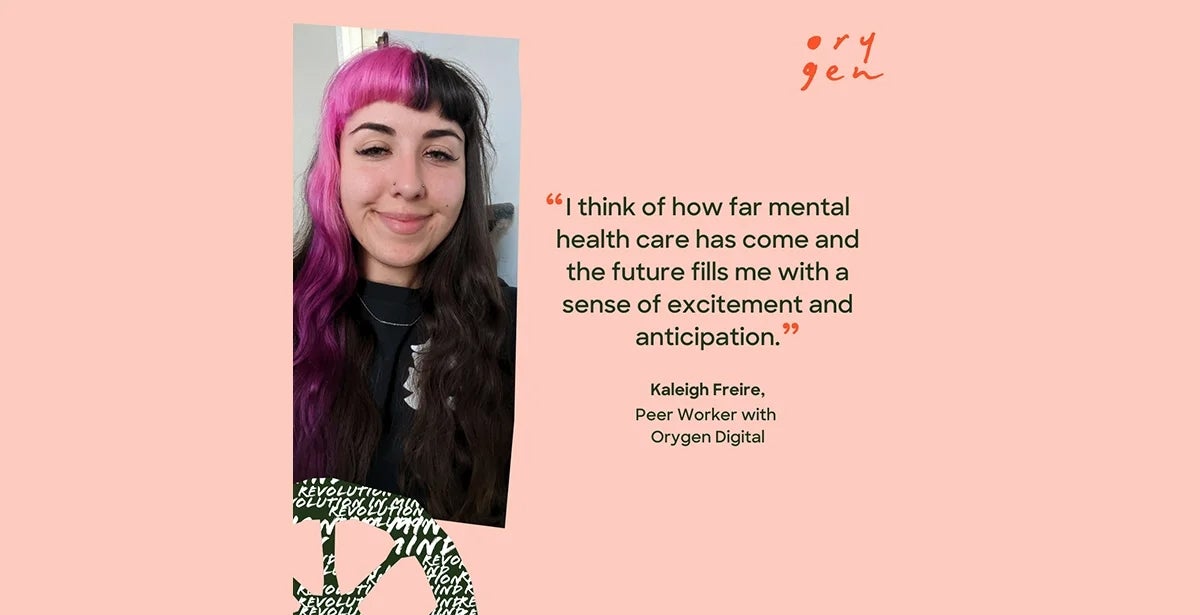
Student story: Why mental health workers are giving young people control of their own care
Mental health concerns in young people are more critical than ever, with the rate of young people experiencing mental ill-health nearly doubling since 2007.
Victoria University and Orygen, Australia’s centre of excellence in youth mental health, have partnered together to build the region’s mental health workforce capacity through education and training opportunities for VU students.
Below, read the story of Kaleigh Freire, a VU graduate and peer worker with Orygen Digital, who shares her reflections on the importance of youth mental health.
As a young person dealing with mental ill-health, I remember the constant struggle against a system that didn’t support me.
Fast forward to today, I think of how far mental health care has come and the future fills me with a sense of excitement and anticipation.
That’s a big change in perspective and for me it’s driven by the impact of a changing workforce and cultural shift towards giving young people control over their own care. For me as a young person with lived experience of mental ill-health and frequent engagement with the Victorian youth mental health system, it has been so amazing to see the impact and changes that are happening in this space.
There is a new wave of professionals coming through with lived experience of mental health struggles and diverse experiences, and it has changed the way in which we interact with young people and has increased our capacity to support them.
For me, the youth mental health space feels much more diverse, welcoming and accommodating for young people. That makes it a more effective system and also makes it such an exciting and inspiring field to study and work in.
Through working as a Peer Worker with Orygen Digital over the past year, it has been particularly fulfilling to see how the mental health field is becoming more client directed.
Now more than ever, the digital mental health space has become invaluable to engage young people who have social and economic barriers to accessing care and has helped in making service provision much more approachable and accessible.
My peer work centres around MOST, which is a digital therapy service that young people can use to connect with others going through similar struggles, as well as access resources like comics centred around handling tough situations. Having this space has been amazing to give young people the autonomy and tools to be able to navigate and direct their own mental health care, as well as advocate for themselves.
As a peer worker on MOST, I have chats with young people around managing things they are going through and what has helped me in the past. I also create content on common topics like managing mental health and relationships, as well as topics like youth advocacy.
Digital mental health also addresses a massive gap in service provision when young people are waiting to access services and allows them to feel supported throughout the process. Giving young people control over their own care is essential in keeping them engaged and ensuring that they have the power to give feedback and create meaningful change in the mental health space.
As workers in the youth mental health field, creating space for young people to develop coping strategies, solutions and access services themselves can feel so fulfilling. Studying and developing expertise in this field can help young people to continue to expand their knowledge and capabilities and empower them to support each other and themselves.
Kaleigh Freire is a peer worker on MOST and a Victoria University graduate.
You can drive a positive impact with VU Online’s Master of Child and Adolescent Mental Health. Commonwealth Supported Placements (CSP) are available for new and eligible students for the Graduate Certificate in Child and Adolescent Mental Health, which comprises the first four units of the masters degree. To learn more, call our team on 1300 682 051 or email futurestudy@online.vu.edu.au.



